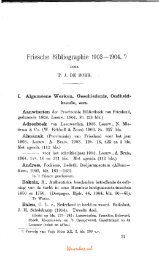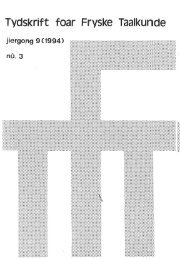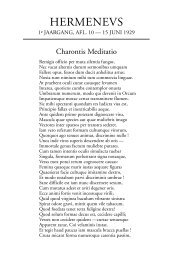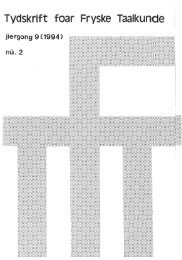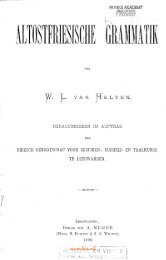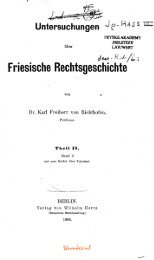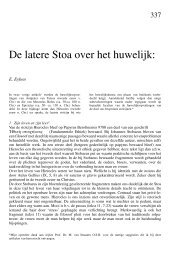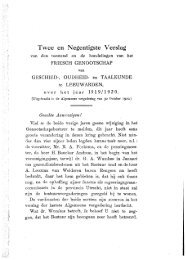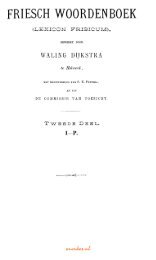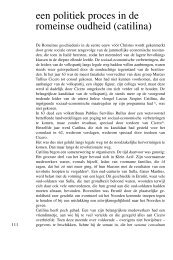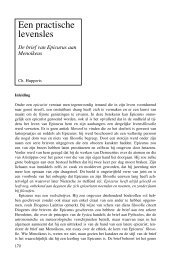It wurk fan Gysbert Japix n-2 - Tresoar
It wurk fan Gysbert Japix n-2 - Tresoar
It wurk fan Gysbert Japix n-2 - Tresoar
You also want an ePaper? Increase the reach of your titles
YUMPU automatically turns print PDFs into web optimized ePapers that Google loves.
8.3. Concise Summary*<br />
This study consists of two parts, a facsimile edition of the oeuvre of <strong>Gysbert</strong> <strong>Japix</strong><br />
(Part I), foliowed by a commentary (Part II). The numbers after the headings in the<br />
summary below refer to the chapters in Part II, unless preceded by an I, in which case<br />
they refer to the pages of Part I.<br />
Object (1.1)<br />
The object of the present investigation are matter and contents of the oeuvre of the<br />
Frisian poet <strong>Gysbert</strong> <strong>Japix</strong> (Bolsward 1603-1666; henceforth GJ) in relation to their<br />
literary and historical context. His work consists of poems in both Frisian and<br />
Dutch, and three rather short prose translations in Frisian, of which two were certainly<br />
translated from French. A large part of the Frisian work was collected in the<br />
posthumously published Friesche Rymlerye (1668) and in its second edition with Supplements<br />
in 1681/1684 (both henceforth FR). The latter also includes letters in Frisian<br />
(and one in Dutch). GJ's Dutch poetry is scattered in literary anthologies and as<br />
liminal verses in the works of others, particularly in collections of sermons. Some of<br />
the poems, especially fhose in Dutch, have come down to us only in manuscript. GJ<br />
may also have composed poetry in Latin but, as far as is known, none of it has survived.<br />
Copies of some of his Frisian poems are held in the Bodleian Library at Oxford.<br />
They were made about 1646 by F. Junius F.F.<br />
For purposes of orientation I first present a survey of earlier opinions of GJ's work<br />
and of currents in the history of criticism. The opinions up to ca. 1770 - there were as<br />
yet no critical studies then - give the impression that they were conceived from a<br />
common point of view. Three elements can be distinguished: 1. GJ is a poet, rieh in<br />
spirit and inventiveness; 2. His work is elegant and artful; and 3. <strong>It</strong> displays affects.<br />
Together these elements evoke the image of a learned poet. After 1770 this view still<br />
prevails, for the time. GJ is seen as a classical poet, who must be judged on the basis<br />
of classical poetics. New, however, is the notion that his work is characterized by<br />
simplicity and a feeling for nature. His artfulness which was observed besides, is attributed<br />
to the bad influence of Gabbema, a friend of the poet. His naturalness was<br />
seen as a characteristic of Frisian and the Frisians (as Stijl wrote as early as 1777) and<br />
equivalent to Greek simplicity. Toward the end of the nineteenth Century, psychological<br />
interpretations of his work set in. About the middle of the twentieth Century, research<br />
begins which aims at accounting for GJ's work by putting it into either its historical<br />
or literary context. Since 1966, this applies particularly to the work of Feitsma,<br />
who has examined its social context, and to the work of Visser, who has pointed out<br />
literary models and parallels.<br />
Aims and working method (1.2)<br />
This study aims at making a contribution to explaining the genesis of literary texts<br />
in the seventeenth Century. My research is limited to matter and contents. Language<br />
and style are paid attention to only if they contain elements which are significant for<br />
the argument. The level of research is the individual text, the formulation of the<br />
problem is the relation of the text to other literary texts and to the non-literary reality<br />
in which it came into being. Research into relations with other texts focusses on the<br />
510<br />
wumkes.nl



